Has this ever happened to you? You prepare a delicious, healthy meal and your kid takes one bite (or even just a look), clenches their jaw tight, and won’t eat what you cooked. Sound familiar? It’s enough to stress out anyone (not to mention destroy your enjoyment of cooking for your family)! So, I wanted to share ideas on what to do when your kid refuses dinner.
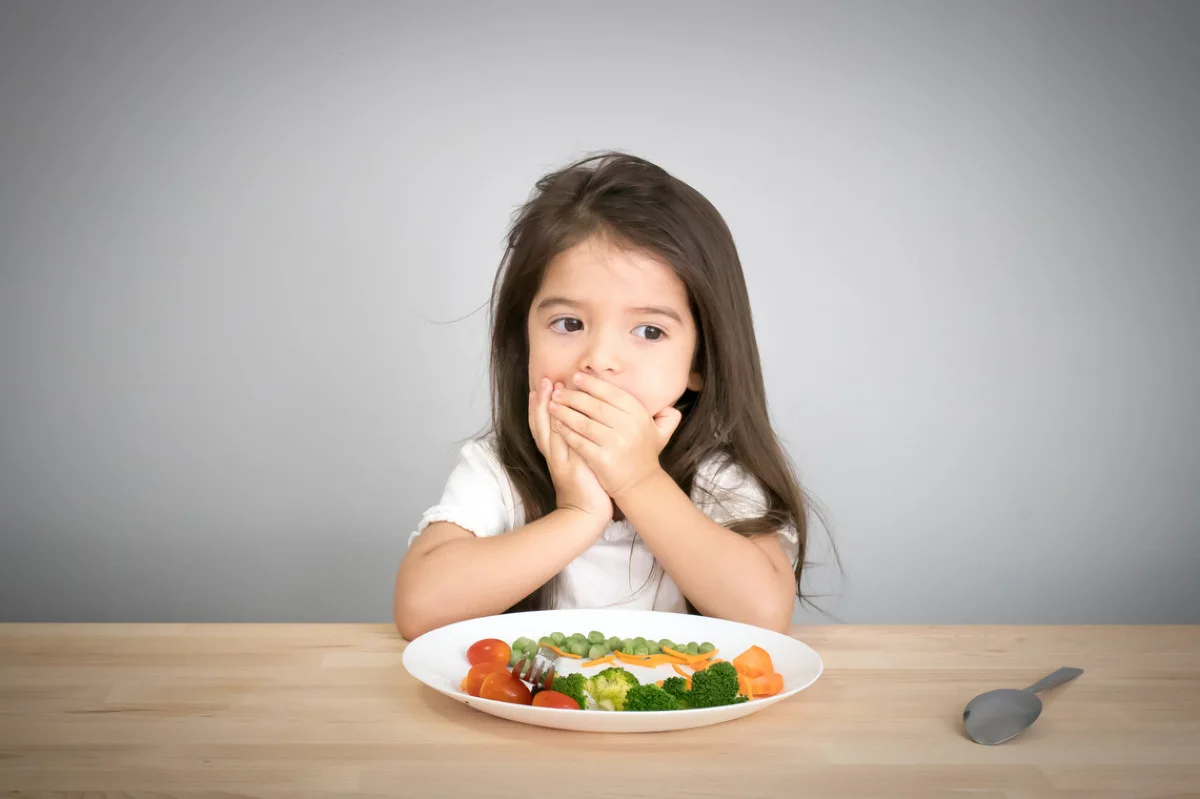
What to Do When Your Kid Refuses Dinner
We’ve all been there. You’ve made an amazing (Scramble) recipe and are so happy that you managed to get a healthy, delicious dinner on the table. Then your kid takes one look or bite and refuses to eat the dinner you just made. Maybe they say, “ewww!” or “I don’t like this!” or maybe they just move the food around on their plate. Regardless of how it’s delivered, the message is loud and clear: I’m not eating that.
So what do you do? Hop up and make them a different meal? Send them to the kitchen to scrounge up something for themselves? Lose your cool and force them to eat more? Or, do you send them up to bed without any dinner?
I know a guy who’s mom forced him to sit at the dining room table to finish his food, even after everyone else had gone to bed. The only light left on in the whole house was the one over his head. To this day, he won’t eat broccoli.
There is no doubt that these moments can be infuriating. They can also be concerning if your child really needs those healthy calories (a struggle we have had in our house). However, family dinners should be about more than just the food, so you don’t want it to become a time of conflict.
Given how challenging these moments are, I wanted to share some tips on what to do when your kid refuses dinner.

Expect Kind Words
What we say in our house is that everyone has different tastes, likes, and dislikes, and that is fine, but how we express those tastes matters. Our kids know that they don’t have to like the food, but they do have to be polite.
So my first tip on how to respond when your kid refuses dinner is that you introduce a new expectation or rule: words such as “eww,” “yuck,” “gross,” or even “I don’t like it” are not allowed at the table. Instead, if your kids need to express a negative feeling about the food on the table, then “it’s not my favorite” or “I’m not a huge fan” are more polite options.
There are two reasons why this is important. One is that those words hurt. If you’ve spent time cooking and then someone says, “yuck!” it stings and makes cooking dinner more of a chore than a joy.
The other is that it sets the expectation that your work to prepare the meal is respected, while also allowing your child to express themselves. This is important because once child knows that they are allowed to have their own likes and dislikes, the tensions (and tantrums) at the table will often dissipate (check out the interview I did with my own formerly picky eater to hear in his own words what this experience was like for him).
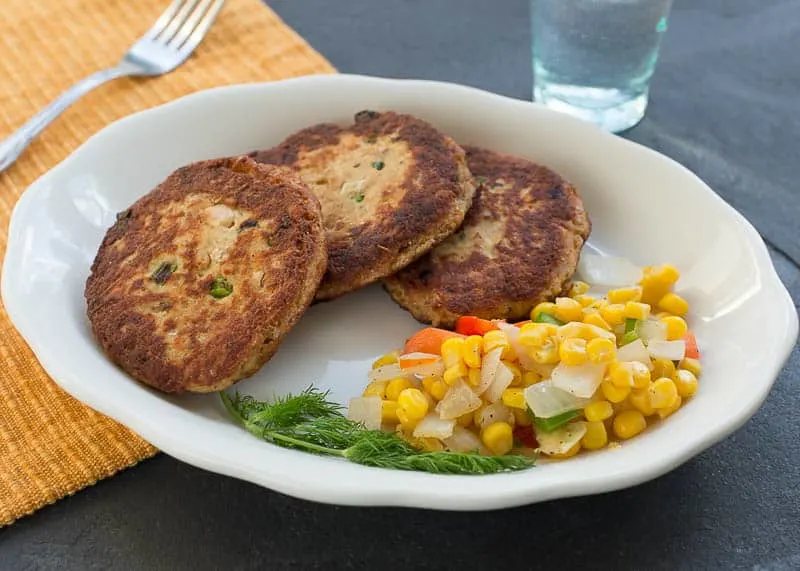
Serve at Least One Food Each Person Will Eat
The second tip for what to do when your kid refuses dinner is to make sure that there is at least one food on the table that your kid will eat. It can just be bread or apple slices, but having a “safe” food on the table will:
- give your kids something to turn to if the dish isn’t their favorite
- take some of the intensity off of trying the new food because they know there is something “safe” to fall back on
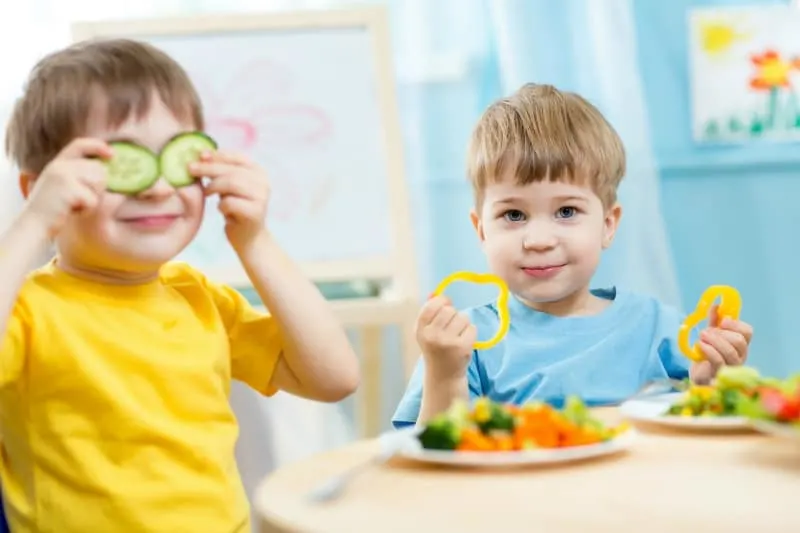
Encourage an “Adventure Bite”
While I don’t advise forcing your child to eat all of something you have served them, I do think it is fine to expect everyone to at least try one bite of the food. In our house we call these “adventure bites.”
This is an important step when your kid refuses dinner for two reasons: (1) it is important for our kids to learn how to try new things (not just food), and (2) research shows that kids often have to try new foods 8-15 times before they accept it, which means trying it over and over again over time is essential.
What if my kid still refuses dinner after their “adventure bite”?
If they’ve taken their “adventure bite” and really can’t find a way to make it work, then the rule in my house is that my kids are allowed to load up on the “safe” food that I have made available. For instance, my younger son once only ate the black beans out of a casserole that “wasn’t his favorite.”
What if my kid refuses to even try the food?
If you’ve got a kid who is really reluctant to try new foods, here are some ways to make it easier for them (and you):
- Provide a glass of water to wash it down.
- Provide a paper towel so they can politely spit it out, if necessary.
- If a bite is too much, start with a lick, a touch, or even just having it on the plate near their other food.
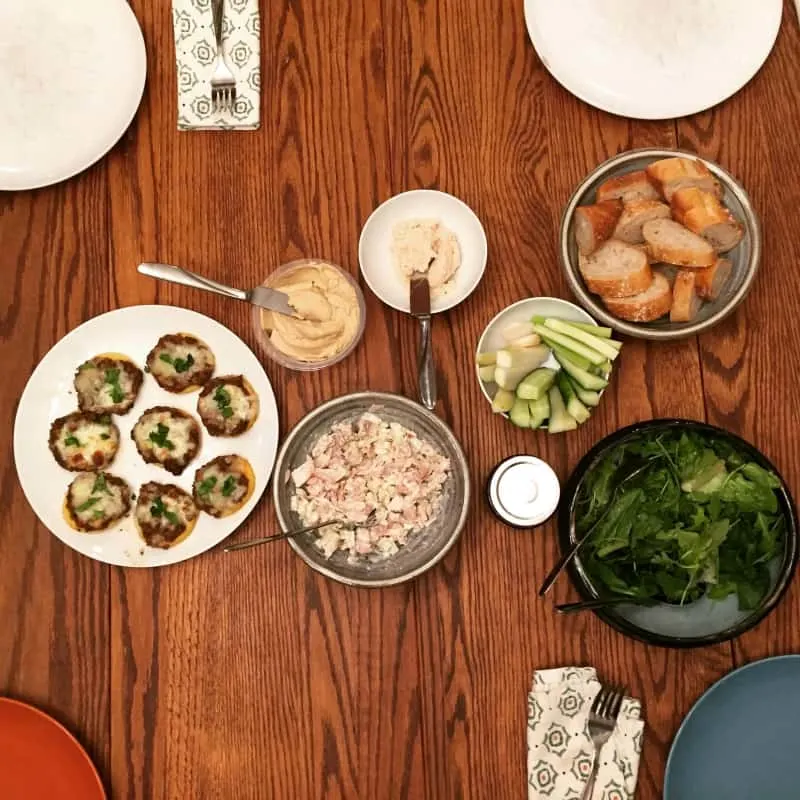
Serve Food Family-Style
Another trick that can be incredibly effective if your kid refuses dinner on a regular basis, is to serve the meal family-style. This isn’t always possible if the dish is super hot or hard to pass, but when doable, it can make a bit difference because it allows the kids to have more control over their food and takes the pressure off you a little bit.
You may also be surprised to see those little hands reaching out for more once they’ve tried it (this is happening more and more in our house and makes me so happy!).

You Are Not a Short-Order Cook
If you have gotten into the habit of making an alternative meal when your kid refuses dinner, stop. This creates cooking burnout for you. It also sends the message that if they hold out, the kids will get whatever they want.
Dinner is dinner and if they don’t want to eat it, they can wait until breakfast. They won’t starve, I promise!
If this represents a huge change for you, then take baby steps. Pick a “back up” food with your kids that is something that requires no cooking, they can (ideally) get themselves, has some nutritional value, and isn’t a favorite. Examples include an apple or banana, some yogurt, some cheese, or toast.
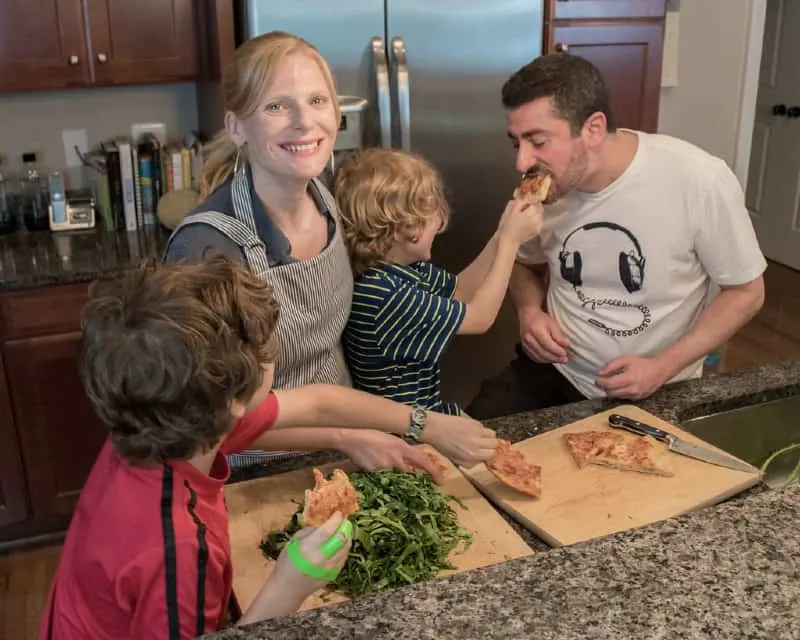
Breathe
The rejection of the food you made can be very painful. Remind yourself that when your kid refuses dinner it is not about you, it is about their developing palettes. So, try your best to change the dynamic and let it go so it doesn’t become a battle.
Remember: you are doing your part—you are providing delicious, healthy meals—now they need to do theirs.
Want more ideas on how to handle dynamics at the dinner table? Check out my interview with my formerly picky eater and 5 reasons to try family-style dining.
I’d love to hear your thoughts in the comments. How do you handle it when your kid refuses dinner? Does the approach above sound harsh or difficult to achieve, or is it what you are doing already?

Patrick
Wednesday 8th of January 2025
omg....you're obviously not going to solve anything with those weak solutions. Starve them. Kids are animals and if you don't feed one for a while they WILL EAT. This is what some of us are forced to do because all these other pussyfoot ideas do nothing! just my opinion :)
How To Make Family Dinners Healthier (Hint: It’s Not About the Food!)
Thursday 1st of February 2024
[…] For more thoughts on handling these tensions, check out our post on what to do when your kid refuses to eat dinner. […]
Hannah
Tuesday 2nd of January 2024
Hello!
My 11 year old son often refuses to eat the dinners I cook. Instead, he just sneaks food later on. Do you recommend putting locks on the pantry and refrigerator? I'm in awe of these children who just accept going to bed without dinner. Wouldn't they just come back into the kitchen and take whatever they look when you're not looking? Of course we tell him not to do this, but he doesn't listen, because he's genuinely hungry. I don't think most people would be able to fall asleep if they were hungry. I find wrappers everywhere in his room, plates under his bed, etc. He will spy on us and wait until we get in the shower, go put the little ones to bed (we have 4 kids), or go to bed ourselves to take whatever he wants. What do you suggest in our situation? Thank you!
Hannah
Thursday 4th of January 2024
@Jessica Braider, Jessica, I can't thank you enough for your prompt reply. I'll be sharing your advice with my husband. We have been taking him to speak with a therapist, and she is working with him on his honesty and trust issues, but she is not a feeding expert. I very much appreciate The Feeding Doctor resource! Meal times have been a struggle his whole life. He is so loving, and also sensitive and intellectually gifted. This leads to him feeling BIG feelings which we are still learning how to navigate, especially around food. As someone who suffered from an eating disorder from 13 until the day I found out I was pregnant with him, our eldest, I am determined to raise children who have a healthy relationship with food. I don't want him to struggle the way I did. Thank you for all you do!
Jessica Braider
Wednesday 3rd of January 2024
Hi Hannah, Thank you so much for sharing what you are going through - I know that a lot of parents can relate!! Because I believe the goal should be helping our kids to build a positive relationship with food, which means learning how to manage behavior and impulses, I am not a fan of putting locks on refrigerators or cabinets. Instead, I would recommend sitting down with your son and having a very honest conversation about the patterns you are seeing. I would explain to him that you think he is old enough and mature enough now that you want to work *with* him to come up with a solution to the issue you are seeing. I would explain that for you, the goal is to have a relationship with each other that is based on honesty, which means that sneaking food has to stop, but also that you want to come up with a way to solve this problem together, so that there is trust. I would ask him why it is that he is unwilling to eat what is made for dinner - is it because he doesn't like the food? Is it because it is hard to sit still? Is it because he isn't hungry at dinnertime? Then you can start to come up with solutions. If it is because he doesn't like the food, maybe you can, together, come up with some ideas of options that can be on the table that he can enjoy even if he doesn't eat everything that is offered. Or, perhaps, you can come up with a food that, when he doesn't like dinner, he can get himself (that requires no cooking, has some nutritional value, and *isn't* a favorite, because then he'll just always choose that). If it is because sitting still is hard, then maybe you can find ways for him to get some energy out before dinner. If it is because he isn't hungry at dinnertime, perhaps you can look together at how to shift snacking schedules. No matter what, the point is to find a solution together, so that you can rebuild the trust and open communication about food. Finally, I would say that if this behavior continues, it might be helpful to pull a professional into the mix. Perhaps talk to your pediatrician or I am a big fan of The Feeding Doctor's work on this issue (https://www.thefeedingdoctor.com/). Hope this helps!
Abraham Alrai
Sunday 24th of September 2023
Here’s my two cents if kids don’t want or like the food in the first place, then why make it for dinner when there is sometimes other options: like send them to bed without dinner, say “fine we won’t make this again”. You can’t tell a child how to feel and what to say, if they don’t like the food they have the right to say “ugh” or “disgusting”
J.L.T
Wednesday 28th of September 2022
My GF 9 yr old son says he doesn't like anything I cook. He wants, pizza, pizza pockets, or some other form of quick fix food other that what is cooked. If you get him to try something he either refuses or cries until she gives up or he taste it and then says I don't like it. I have 3 children of my own who eat whatever is cooked or they now they go to bed hungry. This is causing a rift I'm my relationship and I don't know what to do.
Jessica Braider
Thursday 29th of September 2022
Thanks so much for sharing your story, J.L.T. It sounds like things are really tricky right now. Situations like this one, when there is a food sensitivity or allergy involved, can be especially hard because there may still be traumatic memories of food making him feel sick, which may be adding to his anxieties about food/reluctance to try food. In a situation like this, I would recommend a few things. 1) First, I would recommend that you and your partner sit down and talk with your son about what's going on - NOT at a meal time and just the three of you. He is old enough that he should be able to tell you what is going on in his head when he is presented with new foods. I would explain that this is a stressful situation for everyone and that you both want this to get better for him, but also for you two. And that you two want to work with him to find a way to get things to be better. Ask him: Is he anxious? What does he worry is going to happen? Are there ways that the three of you could make trying foods less stressful? Perhaps some good ideas may come out of this conversation, but don't make any final decisions yet. At the end, I would thank him for his input and tell him you and your partner are going to talk more and then talk with him again. 2) Then, you and your partner need sit down and talk to get on the same page about what the approach is going to be and agree to be consistent. That way the tensions can't build between you two and your son will get consistent messages. In terms of the approach, it will likely need to be a slow process. Maybe it is having him have the food on his plate first, then touch it, then lick it, then put it in his mouth, then swallow. Each at a different meal. Maybe it can be a little faster than that, depending on his openness. But the point is to make it as conflict-free as possible. Some other options to consider, presenting the idea that dinner is dinner and he can choose to eat it or not (perhaps with a try). If he doesn't eat it, then he is responsible for getting something that requires no cooking for himself. It should have some sort of healthy-ness to it (an apple, some cheese, yogurt, peanut butter and jelly, etc.) and NOT be a favorite (or else he might just go to that every time). 3) Once you have agreed on the approach, sit down with your son (again, just the three of you and not at a meal) and present the approach. Then I would suggest you give it a try for a few weeks and then do another check-in. A couple other things: 1) I am not a doctor and can't give medical or nutritional advice, so you might also want to check in with your pediatrician for ideas, 2) It's Not About the Broccoli is a great book that might be a helpful resource for you, 3) The Feeding Doctor (https://www.thefeedingdoctor.com/) also may have some great resources for you.